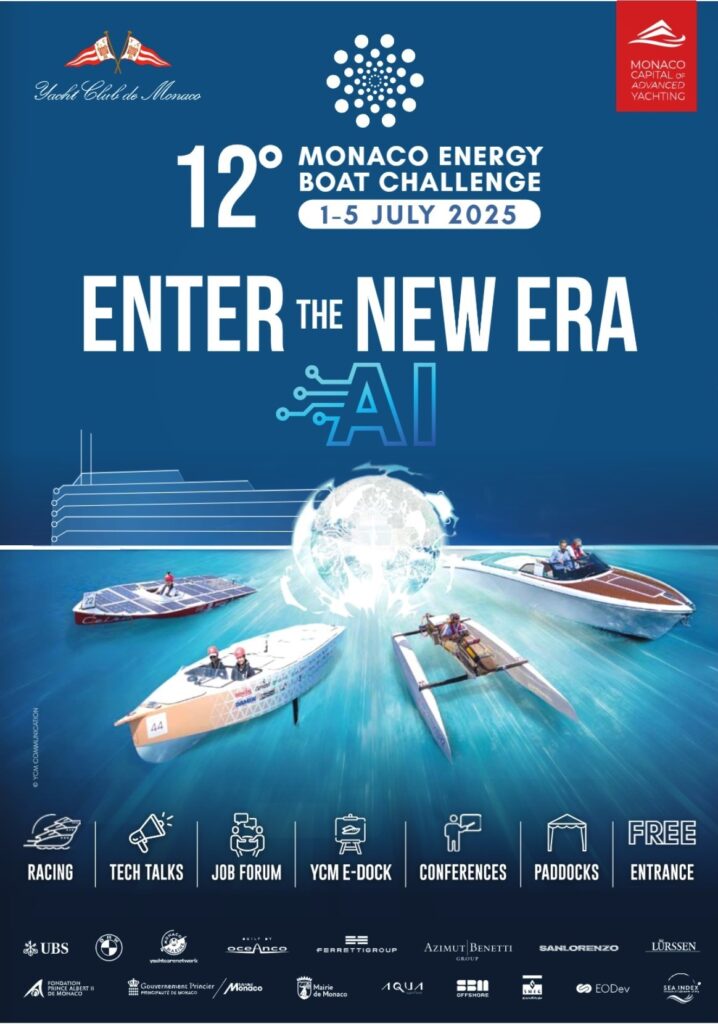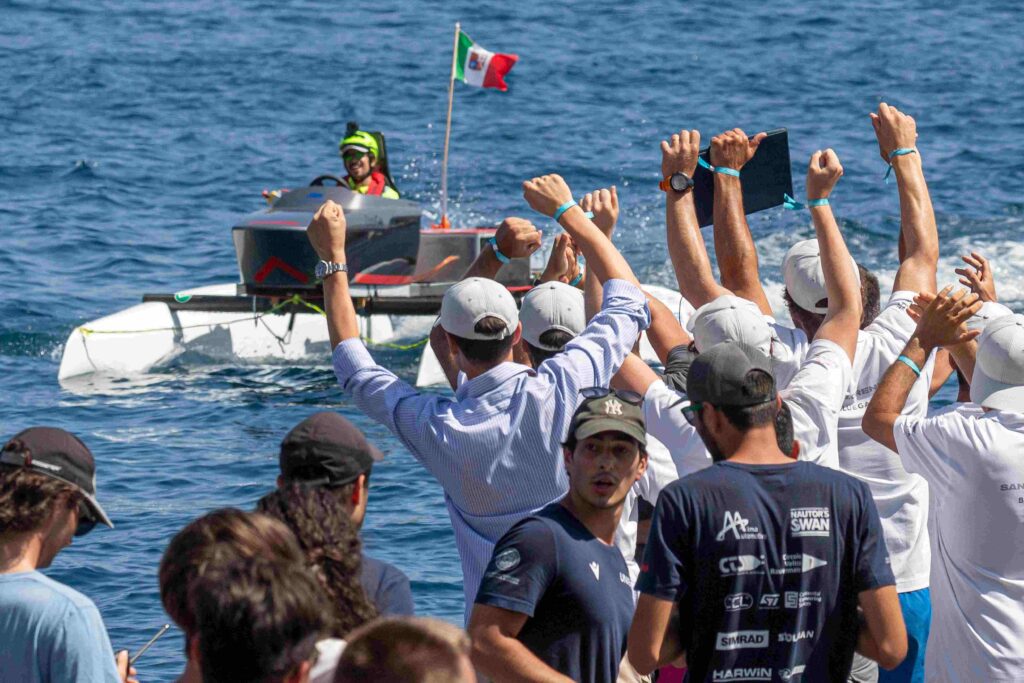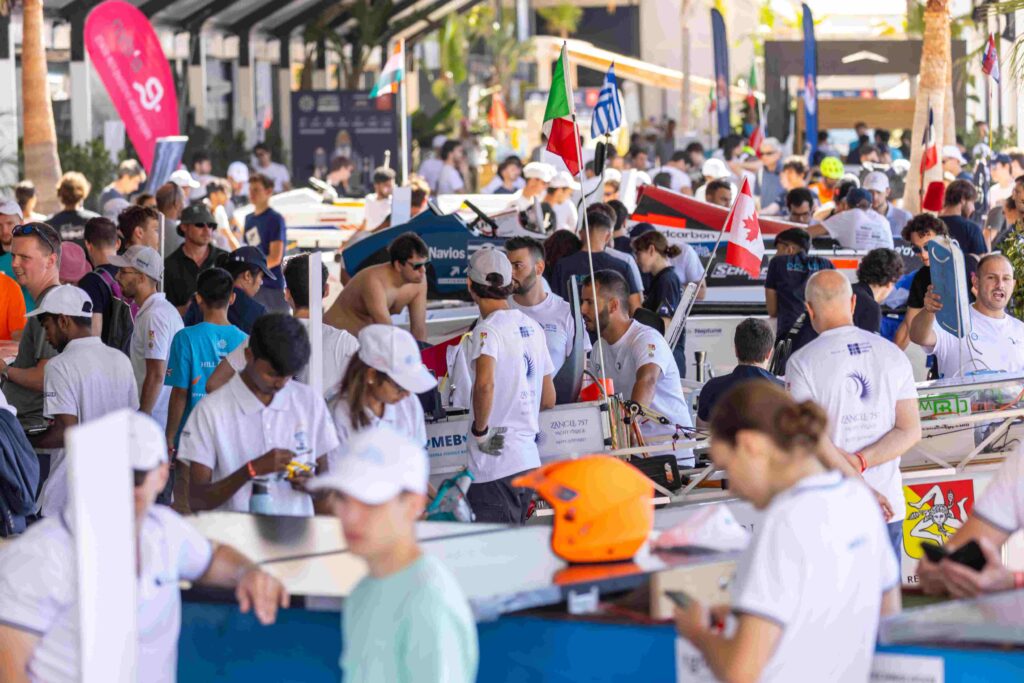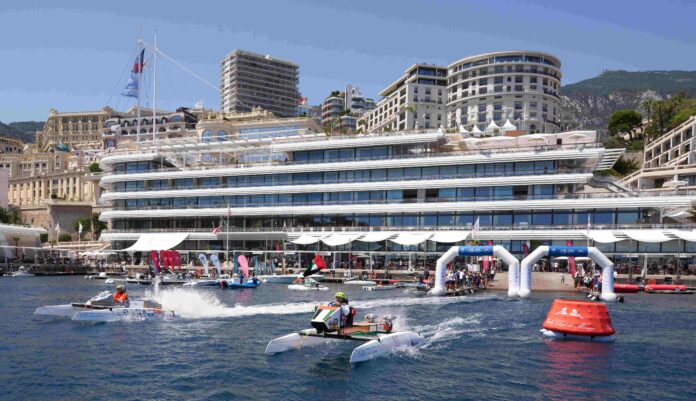With days to go before kick-off, the Monaco Energy Boat Challenge confirms its role as a catalyst for sustainable yachting. Organised by Yacht Club de Monaco, with the support of the Prince Albert II of Monaco Foundation, UBS, BMW and SBM Offshore, the event which is open to the public bridges the gap between academic research and the boating industry with one goal: to rethink maritime mobility under real conditions. “This collaboration is essential to the transition to more responsible yachting. We are delighted to see the growing involvement of major shipyards. It’s very encouraging,” says YCM General Secretary Bernard d’Alessandri.
“This event not only showcases the future of clean energy in maritime mobility, but also reflects our shared vision to drive positive change and forward-thinking leadership through collaboration,” adds Vivien Delaunay, Executive Director at UBS Monaco.
42 teams, 20 nationalities, 29 universities and 1,000+ students involved

Divided into four categories, teams explore technologies for yachting’s future:
- AI Class where the focus is on autonomous boats piloted by artificial intelligence;
- Energy Class which tests technologies aboard standardised hulls;
- SeaLab Class, floating laboratories of experimentation with focus this year on pioneering hydrogen technologies;
- Open Sea Class which showcases CE-certified zero-emission prototypes up to 25m that can take at least 3 people.

Of all projects competing, 30 boats are powered by electricity, 12 operate on hydrogen and 12 prototypes will be on foils.
On route to hydrogen: a decisive step
As technical partner since 2024, NatPower H is now the event’s official hydrogen supplier, providing all the refuelling, an essential step towards achieving the goal of one day organising a zero-emission edition.
“This is a strategic alliance based on a shared vision for more innovative yachting that respects the environment,” says Andrea Minerdo, CEO of NatPower H.
“By facilitating access to hydrogen-powered solutions we are demonstrating that the transition to zero-emission yachting is not only possible, but already underway”.

At the 12th edition, Energy Class contestants will receive hydrogen stored in Type 4 cylinders supplied by Composite Technical Systems (CTS).
Energy Observer in Monaco
The catamaran Energy Observer will be moored in the YCM Marina. The first self-sufficient vessel powered by a mix of solar, wind, hydro and hydrogen produced on board is inviting participants and YCM members, and also the public to visit the boat, Friday 4th July from 9.00am to 12 noon (subject to availability).
Since 2017, this floating laboratory has travelled over 68,000 nautical miles, visited more than 50 countries and proved the reliability of zero-emission technologies in a variety of conditions. Its presence in Monaco embodies the tangible link between research and the energy transition.
Committed network of professionals
Many yachting stakeholders have got involved in supporting teams via the Corporate Mentoring Programme, sharing their expertise with the new generation of engineers.
SBM Offshore is supporting Cambridge University Riviera Racing and the Polytech Nantes.
Shipbuilder Sanlorenzo is collaborating with two teams:
- Uniboat (University of Bologna), a lightweight eco-design boat with battery-hydrogen propulsion, a bespoke propeller of 3D-printed recycled aluminium, and a structure made of bio-sourced materials.
- Elettra UniGe (Università di Genova), compact motorisation, bespoke lithium battery, 3D-printed counter-rotating propellors.
“We absolutely must empower future generations through education, and encourage them to think outside the box to find innovative solutions for leisure boats that reduce our impact on the environment,” says Massimo Perotti, Chairman and CEO of Sanlorenzo, “By investing in students we are paving the way to a better future”.
Azimut | Benetti Group supports Polito H2FLY (Polytecnico di Torino) with a boat combining high-tech materials, an electric motor and a hybrid battery-hydrogen system.
Monaco Marine is accompanying Hydrogadz-Capgemini (Arts et Métiers) who have developed electric propulsion with hydrogen and a modular hull. “This competition reflects to a tee our commitment to promoting marine technological innovation, reducing our industry’s environmental impact and supporting engineering schools,” says Hervé Heimburger, Director of Monaco Marine Universities.
A natural extension to these collaborations is the Job Forum, a bridge to employment. In 2024, some 90 interviews were conducted in the quest for internships or first jobs.
Conferences to think about the future together
Two conferences, requiring prior registration, will focus the discussions:
• Thursday 3rd July: Advanced Yachting Technology Conference will tackle onboard carbon capture, marine noise pollution, financing innovation and decarbonization, cutting costs and emissions through technology, cybersecurity, and leveraging artificial intelligence and space technologies to support decarbonization.
• Friday 4th July: 6th H2 and Alternative Fuels Conference, organised by the Prince Albert II of Monaco Foundation, the Mission for Energy Transition and YCM, with hydrogen refuelling, storage technologies (liquid and solid-state hydrogen), methanol’s potential for superyachts, and the role of dual fuel engines in the energy transition on the programme.
A floating laboratory of innovations attending
- In the Energy Class, Sambuk Racing (Qatar University) make their first appearance and will be using a solid state Li-ion battery, the first of this kind of technology in the history of the Challenge. Néréides-UTT has adopted a composite structure based on natural fibres and are optimising endurance with a hydrogen fuel cell combined with four Li-ion batteries.
- In the SeaLab Class, the Dutch from TU Delft have built a foiling boat compatible with liquid hydrogen. From Scotland, Heriot-Watt University has integrated a solid state hydrogen storage system, safer and more compact. In addition, Plus Zero will be testing a hydrogen internal combustion engine for the first time in the Challenge. Besides that, they use solid state hydrogen storage which uses chemical reaction with water to release hydrogen.
- In the AI Class, the Polish from AGH Solar Boat are combining LiDAR, 3D cameras and use of advanced AI algorithms running on a Jetson Orion computer. The Hungarian team, BME Solar Boat Team, features a lightweight solar‑electric racing boat, optimised for autonomous navigation, powered by advanced electric propulsion systems and onboard AI-driven electronics.
Through these projects a new generation of boats will be unveiled, powered by tangible solutions from around the world.
A prize to reward impact sends strong signal
The Prince Albert II of Monaco Foundation Sustainable Yachting Technology Award, worth €25,000 will reward the most effective advances in energy efficiency and carbon footprint reduction. In 2024, the Italians from Physis Synergy (Politecnico di Milano) won the prize for progress made in their development of a new fuel cell design approach to improve overall efficiency.
With its unique testing ground, the Monaco Energy Boat Challenge is not only tracking the sector’s ecological transition: it’s accelerating it.






